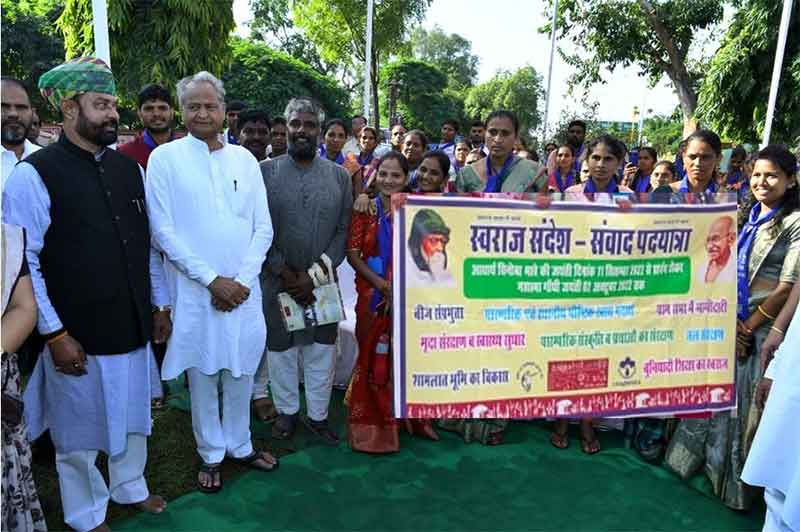
Jayesh Joshi is Coordinator of Vaagdhara voluntary organization. Vaagdhara’s efforts were in news recently due to the organization of a series of nearly 90 village community events relating to protection of indigenous seeds involving participation of about 1000 tribal settlements among whom this organization works in the tri-junction zone of three states Rajasthan, Madhya Pradesh and Gujarat having a significant presence of Bhil tribal communities. This is part of the wider work of this organization based on the precepts of Swaraj and Gram Swaraj which had been an important part of the freedom movement and were particularly emphasized by Mahatma Gandhi as an important indicator of how India’s society and particularly rural society should be rebuilt after colonial rule has ended.
However several people continue to raise questions regarding to what extent these concepts of increasing strength and self-reliance of rural communities are relevant and present in times of globalization. Here Jayesh Joshi answers these and other important related questions on the basis of his experiences of working on the swaraj and gram swaraj principles.
Q—How do you seek to realize the principles of swaraj and gram swaraj in the course of your work in rural areas?
A—Actually we work in four key areas which we call True Agriculture, True Democracy, True Health and True Childhood. However the work in all four areas is guided by the precepts of swaraj and gram swaraj which Mahatma Gandhi had emphasized so much and other prominent freedom fighters had also supported and highlighted. These precepts help us in finding the right direction of our work. The emphasis on natural farming and protecting indigenous seeds is very much related to this, as well as the strengthening of gram sabhas and tribal rural communities. When working among children also we give attention to improving nutrition and education of course but in addition we also work to ensure that growing up children and youth are not alienated from their communities and remain committed to community welfare. While working on health we try to have an understanding of a more holistic view of good health instead of merely curative aspects and we also protect the traditional knowledge communities have of treating on the basis of herbs, other minor produce of trees and forests known to them. To protect nutrition and prevent the onslaught of junk food we try to highlight various tasty and healthy local food products and local dishes based on them among our communities and particularly among children. Festivals of local food and dishes or of protecting indigenous seeds become very creative events in which all community members particularly women are happy to participate and in addition learn much in happy surroundings. Children are even happier when they have several tasty dishes to taste!
A very important part of swaraj is in the context of increasing the strength and self-reliance of rural communities and our work relating to spread of natural farming and protecting indigenous seeds is both guided by this and at the same time also contributes much to this.
Q-What have been experiences regarding understanding traditional knowledge systems?
A–We at Vaagdhara always go to the field with respect for the traditional knowledge of rural communities and particularly for the traditional knowledge systems of tribal communities among whom we largely work. In fact you can properly work only with a good understanding on the basis of such respect and a willingness to learn. If someone goes only to these communities to impose or implant one’s own ideas, then such an approach will not yield any good results. Our understanding has been that basically the traditional systems make very good use of local resources in sustainable ways and problems arise mainly when due to external factors these systems come under some serious strain.
Q–How relevant are concepts like swaraj and gram swaraj to present times?
A–We believe in these concepts and work on this basis. Our understanding is that the value and importance of these concepts has increased and not decreased as these are increasingly relevant for resolving several problems and challenges that we face. In the context of climate change mitigation as well as adaptation, such self-reliance is important for reducing the burden of fossil fuels, for increasing the resilience of rural communities. In the context of resolving the crisis of farmers and for protecting them from rising costs and debts again these concepts are very important.
Q-In your work are you helped by the reform and mobilization efforts made earlier?
A—Yes of course. This is the Bhil region where the famous Govind Guru and his colleagues and followers had initiated very important efforts for justice as well as social reform in colonial times and these continue to have an enduring importance as reflected even in daily life, such as the greetings exchanged by villagers and their resistance to intoxicants.
Subscribe to Our Newsletter
Get the latest CounterCurrents updates delivered straight to your inbox.
Q-some people say there should be growing inter-actions with the outside world.
A.-Our concept of gram swaraj has never opposed such inter-actions and in fact our foot marches have been going to many, many other villages in which members of tribal communities inter-act on many issues with people of new villages they are visiting and we believe that in such inter-actions both sides learn from each other. The principle of gram swaraj is never against such wider inter-actions, it is only for promoting self-reliance in some crucial respects.
Our understanding of the traditional knowledge does not come in the way of taking that new scientific knowledge among people and villages that can be helpful for them and helps their self-reliance. Swaraj never comes in the way of learning for real, genuine improvement.
Bharat Dogra is a writer on development, peace and environmental issues.
















































